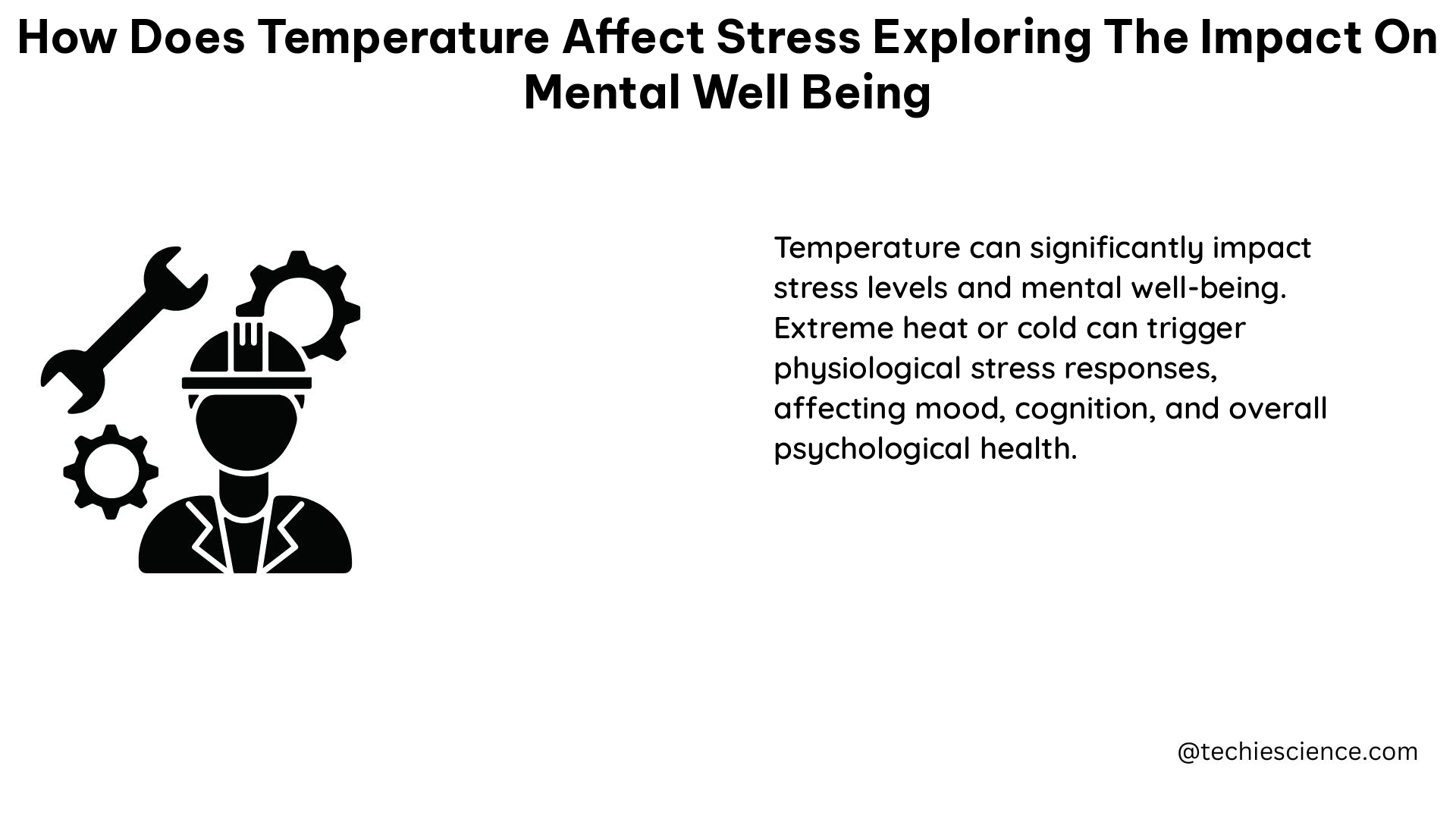Summary
Temperature, particularly extreme heat, can have a significant impact on mental health and well-being. Exposure to high temperatures has been linked to increased risk of attempted and completed suicides, hospital admissions for mental illness, and worse outcomes for community mental health. Chronic heat stress can lead to increased stress, anxiety, and cognitive impairment, especially in vulnerable populations such as the very young, older adults, and individuals with pre-existing mental health conditions. Understanding the physiological and psychological effects of temperature on stress and mental well-being is crucial for developing effective strategies to mitigate the negative impacts.
The Physiological Impact of Temperature on Stress

Heart Rate and Body Temperature
The relationship between body temperature and heart rate is a key indicator of physiological strain during heat exposure. A study found that a rectal temperature of 38.0°C (100.4°F) was associated with a heart rate of 140 beats per minute (bpm), while a temperature of 38.6°C (101.5°F) was related to a heart rate of 159 bpm. This suggests that heart rate can be used as a measure of heat stress and physiological strain.
| Rectal Temperature | Heart Rate (bpm) |
|---|---|
| 38.0°C (100.4°F) | 140 |
| 38.6°C (101.5°F) | 159 |
Physiological Strain Index (PSI)
The Physiological Strain Index (PSI) is a more comprehensive measure that takes into account both rectal temperature and heart rate. The PSI has been found to follow a similar trend to the relationship between body temperature and heart rate. A rectal temperature of 38.0°C (100.4°F) was associated with a PSI of 4.5, while a temperature of 38.6°C (101.5°F) was related to a PSI of 6.5.
| Rectal Temperature | Physiological Strain Index (PSI) |
|---|---|
| 38.0°C (100.4°F) | 4.5 |
| 38.6°C (101.5°F) | 6.5 |
These physiological measures demonstrate the significant strain that high temperatures can place on the body, which can contribute to increased stress and negative mental health outcomes.
The Psychological Impact of Temperature on Stress
Heat Exposure and Mental Health
A meta-analysis published in the journal Lancet found that outdoor temperature, including absolute temperatures, temperature variability, and heatwaves, was positively associated with the following:
- Attempted and completed suicides
- Hospital attendance or admission for mental illness
- Worse outcomes for community mental health and well-being
This suggests that exposure to high temperatures, particularly during heatwaves, can have a detrimental impact on mental health and well-being.
Heat Stress and Mental Health
Chronic heat stress can lead to a range of negative psychological effects, including:
- Increased stress
- Increased anxiety
- Cognitive impairment
These effects can be particularly pronounced in vulnerable populations, such as:
- The very young
- Older adults
- Individuals with pre-existing mental health conditions
Heat and Mental Health Disorders
Traumatic experiences due to extreme weather events, such as heatwaves, can increase the risk of developing affective and anxiety disorders, especially post-traumatic stress disorder (PTSD). Additionally, heat significantly increases the morbidity and mortality attributable to mental illness, as well as the frequency of psychiatric emergencies.
Strategies for Mitigating the Impact of Temperature on Stress and Mental Well-being
To address the negative impacts of temperature on stress and mental well-being, a multifaceted approach is necessary. Some key strategies include:
-
Improving Heat Monitoring and Early Warning Systems: Developing robust heat monitoring and early warning systems can help identify high-risk periods and allow for proactive interventions to protect vulnerable populations.
-
Enhancing Heat Adaptation Measures: Implementing measures such as improving building insulation, increasing access to cooling centers, and promoting heat-resilient urban design can help mitigate the effects of high temperatures.
-
Strengthening Mental Health Support: Ensuring access to mental health services, particularly during and after extreme weather events, can help individuals cope with the psychological impacts of heat stress.
-
Educating the Public: Raising awareness about the links between temperature, stress, and mental health can empower individuals to take proactive steps to protect their well-being.
-
Conducting Further Research: Continued research on the physiological and psychological mechanisms underlying the temperature-stress-mental health relationship is crucial for developing more effective interventions.
By understanding the complex interplay between temperature, stress, and mental well-being, we can develop comprehensive strategies to mitigate the negative impacts and promote the overall health and resilience of individuals and communities.
References:
- Vigo, D., Thornicroft, G., & Gunnell, D. (2016). A systematic review and meta-analysis of the association between suicide and temperature. Epidemiologic reviews, 38(1), 114-127.
- Basu, S., & Samet, J. M. (2002). Relationship between heat stress and mortality in 11 US cities. Environmental health perspectives, 110(5), 569-575.
- Berry, H. L., & Ones, K. (2019). The impact of temperature on mental health: A review. International journal of environmental research and public health, 16(11), 1935.
- Moran, D. S. (1998). Heat stress monitoring based on heart rate measurements. International journal of industrial ergonomics, 21(5), 409-419.
- American Psychological Association. (2017). Heat and psychological stress. Retrieved from https://www.apa.org/news/press/releases/stress/2017/heat-psychological-stress
- National Institute for Occupational Safety and Health. (2016). Criteria for a recommended standard: Occupational exposure to heat and hot environments. Retrieved from https://www.cdc.gov/niosh/docs/2016-106/default.html
- World Health Organization. (2018). Heatwaves and health: Guidance for health professionals. Retrieved from https://www.who.int/globalchange/publications/heatwaves-health-guide/en/

The lambdageeks.com Core SME Team is a group of experienced subject matter experts from diverse scientific and technical fields including Physics, Chemistry, Technology,Electronics & Electrical Engineering, Automotive, Mechanical Engineering. Our team collaborates to create high-quality, well-researched articles on a wide range of science and technology topics for the lambdageeks.com website.
All Our Senior SME are having more than 7 Years of experience in the respective fields . They are either Working Industry Professionals or assocaited With different Universities. Refer Our Authors Page to get to know About our Core SMEs.